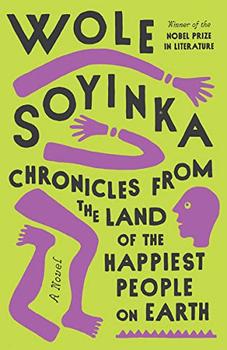Summary | Excerpt | Reading Guide | Reviews | Beyond the book | Read-Alikes | Genres & Themes | Author Bio

Helen Oyeyemi draws on Nigerian mythology to present a strikingly original variation on a classic literary theme: the existence of "doubles," both real and spiritual, who play havoc with our perceptions and our lives.
Jessamy "Jess" Harrison is eight years old. Sensitive, whimsical, possessed of
an extraordinary and powerful imagination, she spends hours writing haiku,
reading Shakespeare, or simply hiding in the dark warmth of the airing cupboard.
As the child of an English father and a Nigerian mother, Jess just can't shake
off the feeling of being alone wherever she goes, and the other kids in her
class are wary of her tendency to succumb to terrified fits of screaming.
Believing that a change from her English environment might be the perfect
antidote to Jess's alarming mood swings, her parents whisk her off to Nigeria
for the first time where she meets her mother's family—including her formidable
grandfather.
Jess's adjustment to Nigeria is only beginning when she encounters Titiola, or
TillyTilly, a ragged little girl her own age. To Jess, it seems that, at last,
she has found someone who will understand her. But gradually, TillyTilly's
visits become more disturbing, making Jess start to realize that she doesn't
know who TillyTilly is at all.
Helen Oyeyemi draws on Nigerian mythology to present a strikingly original
variation on a classic literary theme: the existence of "doubles," both real and
spiritual, who play havoc with our perceptions and our lives. Lyrical, haunting,
and compelling, The Icarus Girl is a story of twins and ghosts, of a
little girl growing up between cultures and colors. It heralds the arrival of a
remarkable new talent.
ONE
"Jess?"
Her mother's voice sounded through the hallway, mixing with the
mustiness around her so well that the sound almost had a smell. To Jess,
sitting in the cupboard, the sound of her name was strange, wobbly,
misformed, as if she were inside a bottle, or a glass cube, maybe, and
Mum was outside it, tapping.
I must have been in here too long--
"Jessamy!" Her mother's voice was stern.
Jessamy Harrison did not reply.
She was sitting inside the cupboard on the landing, where the towels and
other linen were kept, saying quietly to herself, I am in the
cupboard.
She felt that she needed to be saying this so that it would be real. It
was similar to her waking up and saying to herself, My name is
Jessamy. I am eight years old.
If she reminded ...
 Kerri Sakamoto, author of The Electrical Field and One Hundred Million Hearts
The Icarus Girl is a dark enchantment that leads readers into the recesses of a young girl's fevered psyche. A bewitching tale of childhood joy and wonder, pain, loss, and cultural estrangement."
Kerri Sakamoto, author of The Electrical Field and One Hundred Million Hearts
The Icarus Girl is a dark enchantment that leads readers into the recesses of a young girl's fevered psyche. A bewitching tale of childhood joy and wonder, pain, loss, and cultural estrangement."Helen Oyeyemi was born in
Nigeria in 1984 and has lived in London from
the age of four.
Even though she says she doesn't do happiness - 'I don't trust it' - she had much to smile about
in 2004 when Bloomsbury UK (J.K. Rowling's publisher) signed her up for a two-book deal at the age of 19 years, on the basis of the manuscript of The Icarus Girl that she wrote while studying for her A-Levels (exams taken before leaving UK high schools). She says, 'I signed the contract on the day I got my exam results'. Although she refuses to reveal the size of the advance she says its enough to put her through university and help out her parents financially (her father teaches children...
This "beyond the book" feature is available to non-members for a limited time. Join today for full access.

If you liked The Icarus Girl, try these:

Chronicles from the Land of the Happiest People on Earth
by Wole Soyinka
Published 2022
From the first Black winner of the Nobel Prize in Literature and one of our fiercest political activists, a fictional meditation on power and greed - at once a literary hoot, a whodunit, and a scathing indictment of political and social corruption.

by Marlon James
Published 2020
In the stunning first novel in Marlon James's Dark Star trilogy, myth, fantasy, and history come together to explore what happens when a mercenary is hired to find a missing child.




When an old man dies, a library burns to the ground.
Click Here to find out who said this, as well as discovering other famous literary quotes!